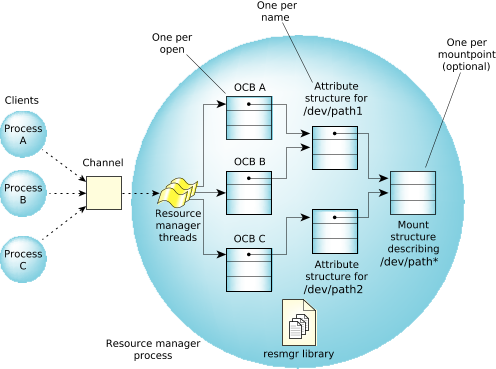Since a large number of the messages received by a resource manager deal with a common set of attributes, the OS provides another level of default handling.
This second level, called the iofunc_*() shared library, allows a resource manager to handle functions like stat(), chmod(), chown(), and lseek() automatically, without the programmer having to write additional code. As an added benefit, these iofunc_*() default handlers implement the POSIX semantics for the messages, again offloading work from the programmer.
Three main structures need to be considered:
- context
- attributes structure
- mount structure
 Figure 1. A resource manager is responsible for three data structures.
Figure 1. A resource manager is responsible for three data structures.The first data structure, the context, has already been discussed (see the section on “Message types”). It holds data used on a per-open basis, such as the current position into a file (the lseek() offset).
Since a resource manager may be responsible for more than one device (e.g., devc-ser* may be responsible for /dev/ser1, /dev/ser2, /dev/ser3, etc.), the attributes structure holds data on a per-device basis. The attributes structure contains such items as the user and group ID of the owner of the device, the last modification time, etc.
For filesystem (block I/O device) managers, one more structure is used. This is the mount structure, which contains data items that are global to the entire mount device.
When a number of client programs have opened various devices on a particular resource, the data structures may look like this:
 Figure 2. Multiple clients opening various devices.
Figure 2. Multiple clients opening various devices.The iofunc_*() default functions operate on the assumption that the programmer has used the default definitions for the context block and the attributes structures. This is a safe assumption for two reasons:
- The default context and attribute structures contain sufficient information for most applications.
- If the default structures don't hold enough information, they can be encapsulated within the structures that you've defined.
By definition, the default structures must be the first members of their respective superstructures, allowing clean and simple access to the requisite base members by the iofunc_*() default functions:
 Figure 3. Encapsulating the default data structures used by resource managers.
Figure 3. Encapsulating the default data structures used by resource managers.The library contains iofunc_*() default handlers for these client functions: